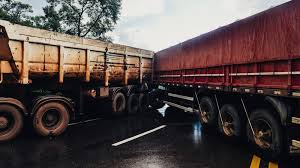Table of Contents
- What Is A Tractor-Trailer Rollover Accident?
- Common Causes Of Rollover Accidents
- How To Prevent Tractor-Trailer Rollover Accidents
- Impact On Traffic And Public Safety
- Legal Repercussions Of Tractor-Trailer Accidents
What Is A Tractor-Trailer Rollover Accident?
A rollover accident involving a tractor-trailer happens when a big truck overturns onto its side or roof, resulting in severe injuries and significant property damage. These incidents are dangerous because of the dimensions and mass of the vehicle that was part of it. Incidents like rollover tractor trailer accidents highlight the importance of understanding their causes and prevention strategies. Given the catastrophic outcomes, it is essential to delve deeper into these accidents to mitigate their occurrence. Rollovers can happen in a split second but have lasting effects on those involved, from physical injury to significant financial losses.
Common Causes Of Rollover Accidents
Several factors contribute to tractor-trailer rollover accidents. These include:
- Driver Error: Fatigue, distraction, and improper handling can lead to rollovers. Drivers working long hours may have diminished attention spans, making them more susceptible to errors.
- Speeding: Excessive speeding increases the chance of losing control, reducing the time to react to obstacles and sharp turn
- Poor Road Conditions: Potholes, sharp turns, and slippery roads are significant risk factors. These conditions can destabilize even the most well-maintained trucks.
- Improper Loading: Unbalanced or unsecured loads can tip a car over. Proper load distribution is crucial to maintaining vehicle balance, especially during turns or sudden maneuvers.
How To Prevent Tractor-Trailer Rollover Accidents
Prevention strategies are critical in reducing the number of rollover accidents. Trucking companies and drivers can do the following:
- Implement Comprehensive Training Programs: Ensure drivers are well-trained in handling and maneuverability. Training should include simulated emergency scenarios to prepare drivers for real-world situations.
- Regular Vehicle Maintenance: Regularly inspect and maintain vehicles to ensure they are in good working condition. Components like brakes, tires, and suspension systems should be scrutinized.
- Use Technology: Equip trucks with electronic stability control systems to help prevent rollovers. These systems monitor vehicle dynamics and assist in maintaining control during critical situations.
- Follow Proper Loading Procedures: Ensure cargo is secured correctly and evenly distributed. Adhering to load limits and distribution guidelines can prevent imbalances that lead to rollovers.
Impact On Traffic And Public Safety
Rollover accidents often lead to significant traffic disruptions and pose a severe safety risk to other road users. Major highways can be closed for hours, and secondary accidents can occur due to sudden roadblocks. Additionally, the hazardous materials often carried by these trucks can lead to environmental and health hazards if spilled. For instance, a chemical spill on a busy freeway could necessitate evacuations and extensive clean-up operations, impacting the environment and local communities. Moreover, the aftermath of a rollover accident is often chaotic, with emergency services scrambling to manage the scene, clear debris, and care for the injured. This can strain local resources and lead to extended response times for other incidents. The ripple effect on public safety and traffic flow underscores the critical need for effective prevention strategies to minimize accidents and their far-reaching consequences.
Legal Repercussions Of Tractor-Trailer Accidents
The consequences of tractor-trailer accidents in terms of the law can be harsh. Drivers could potentially be charged with offenses varying from reckless driving to manslaughter, depending on the situation. Companies may also be responsible for negligence if they neglect to implement appropriate safety and maintenance procedures. Legal disputes after such incidents can be prolonged and complicated, frequently encompassing numerous participants like drivers, trucking firms, insurance companies, and possibly even manufacturers in cases where vehicle malfunctions are deemed a factor.
Moreover, individuals involved in rollover accidents can pursue legal action to receive compensation for medical expenses, lost income, and other losses, resulting in substantial financial responsibilities for those at fault. The legal system aims to determine responsibility and guarantee fair reimbursement, but the procedure can overwhelm everyone affected. This legal environment highlights the need for strict prevention measures to prevent rollover accidents’ costly and harmful consequences.



